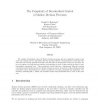Free Online Productivity Tools
i2Speak
i2Symbol
i2OCR
iTex2Img
iWeb2Print
iWeb2Shot
i2Type
iPdf2Split
iPdf2Merge
i2Bopomofo
i2Arabic
i2Style
i2Image
i2PDF
iLatex2Rtf
Sci2ools
128
click to vote
UAI
2000
2000
The Complexity of Decentralized Control of Markov Decision Processes
We consider decentralized control of Markov decision processes and give complexity bounds on the worst-case running time for algorithms that find optimal solutions. Generalizations of both the fullyobservable case and the partially-observable case that allow for decentralized control are described. For even two agents, the finite-horizon problems corresponding to both of these models are hard for nondeterministic exponential time. These complexity results illustrate a fundamental difference between centralized and decentralized control of Markov decision processes. In contrast to the problems involving centralized control, the problems we consider provably do not admit polynomial-time algorithms. Furthermore, assuming EXP = NEXP, the problems require super-exponential time to solve in the worst case.
Related Content
| Added | 01 Nov 2010 |
| Updated | 01 Nov 2010 |
| Type | Conference |
| Year | 2000 |
| Where | UAI |
| Authors | Daniel S. Bernstein, Shlomo Zilberstein, Neil Immerman |
Comments (0)

